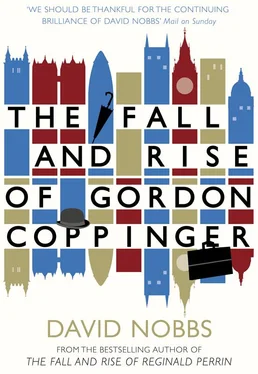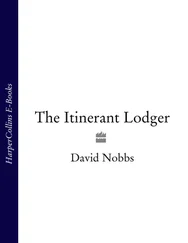He tried to remember the events of the previous evening, but they stubbornly refused to come. Had he made love? He didn’t think so. That suggested, but didn’t prove, that he was with his wife. The fact that he couldn’t remember also seemed to indicate, but again didn’t prove, that he’d endured an ordinary Sunday evening at home.
Yes! They’d been watching the Antiques Roadshow . He’d said, ‘Bloody morons, they’ve had it for thirty-five years and they haven’t even noticed the maker’s name’; she’d told him to shut up in a very unladylike tone; he’d said, ‘I wish he’d break that fucking vase over Fiona Bruce’s head’; she’d said, ‘If you’re going to be unpleasant leave me alone’; and then not half an hour later she’d ticked him off for not wanting to watch Downton Abbey with her. Downton Abbey ! He’d explained that life was too short to bother with things that hadn’t happened to people who’d never existed. She’d shouted, like a fishwife – was that fair on fishwives, if such people still existed? – that he was ruining her Sunday evening.
Yes, he was at home.
Lady Coppinger had watched Downton Abbey ; he’d trawled the Net looking for references to himself, while slowly sipping a large glass of the sixteen-year-old Lagavulin and wondering from what revolting bottle Jack was seeking oblivion at that very moment, under some bridge or in some dark alley. Then he’d slipped quietly into bed beside Her Ladyship, planted the obligatory kiss on her cheek so softly that it could not possibly arouse her, switched the light off and gone straight into guiltless sleep, while she’d read a bit of some soppily romantic book by some much-loved authoress who in real life had been such a frightful snobbish bitch that she’d have been drummed out of Dudley with disdain.
He was at home with Christina. A cocktail of relief and disappointment swept over him, and suddenly he recalled the date and realized why he had felt that this was an important day. It was 31 October. Halloween. His wife’s birthday.
Yes, he had married a witch.
No, he hadn’t married a witch. That had been their little joke. It wasn’t a joke now. She hadn’t been a witch when he’d met her. She’d been as lovely and as full of promise as the dawn. She hadn’t been a witch when he’d courted her, proposed to her, married her. She had been his innocence. He had turned her into a witch. He had fucked his own innocence.
He didn’t like these thoughts, and he wasn’t used to having thoughts that he didn’t like. It was time to get up.
But he didn’t. His body still didn’t stir.
This was dreadful. Regret could play no part in his life. There wasn’t time for regret. Besides, he had everything he wanted. How can a man have regrets if he has everything he wants? Because he didn’t want to have everything he wanted? That was ridiculous. Because he didn’t actually have everything he wanted? Because it was impossible to have everything you wanted, because what you wanted came attached to what you didn’t want, as in fame and photographers?
Photographers! If he had known what was to come!
And yet – and again this only occurred to him afterwards – that morning he did have at least an inkling of what was to come. He had a presentiment. Perhaps, he would suggest to his doctor later, his blankness had been caused by his having, subconsciously, a presentiment that he was going to have a presentiment. His doctor, who was Scottish, would say that was a bit too fanciful for him. He would say that there must have been a physical cause, the position he had slept in, the supply of blood, maybe even some kind of very minor stroke. He would suggest tests. Sir Gordon would pretend to agree.
At last he began to move, easing himself slowly out of the king-sized bed. He padded carefully across the thick, luscious carpet in the utter blackness. He knew from long experience the exact position of the door. He placed his hand on the handle, turned it ever so slowly.
Lady Coppinger gave a low moan which seemed to Sir Gordon to be a rebuke of cosmic proportions, but she didn’t wake.
He was relieved that his wife was still asleep, that he didn’t have to face her yet.
So it had come to this.
The suspicions that would overwhelm him
He seated himself at the round rosewood (what else?) dining table in the exact centre of the gigantic dining room, whose panelling was as Elizabethan as it could be in a house built in 1932. The table seated twelve, and most mornings, as he breakfasted in solitary splendour, he derived pleasure from the sight of the eleven empty places.
He was smartly dressed in the clothes Lady Coppinger had laid out for him the previous evening. He had no colour sense. She did. You couldn’t breed roses without having a colour sense.
Farringdon emerged from the kitchens and slid gravely towards Sir Gordon like a stately home on legs. He carried a glass of freshly squeezed orange juice and a pile of newspapers. Sir Gordon, who was still feeling quite deeply disturbed by his lapse of memory, tried to look the essence of calm, and gave a small, studied smile.
‘Good morning, Farringdon,’ he said, and he thought he detected a slight nervous quiver in his voice. Farringdon didn’t appear to notice it, but then Farringdon would not have appeared to notice it if his employer had come in to breakfast naked. In the early days Sir Gordon had been slightly unnerved by Farringdon’s eyes. There never seemed to be any expression in them. It looked, in certain lights, from certain angles, as if he had two glass eyes. Sir Gordon was used to this now. He found it restful.
‘Good morning, sir. Sir has slept well?’ said Farringdon gravely.
‘Sir has slept very well, thank you, Farringdon.’
‘That is good news, sir.’
The politenesses over, Farringdon got straight down to business, listing for Sir Gordon, in the unchanging daily ritual, all the pages of the newspapers that mentioned him: ‘ Telegraph page seven, Times business page two, Sun page two—’
‘Opposite the totty!’
‘Indeed, sir.’
‘ Mirror page twenty-seven—’
‘Page twenty-seven! That’s a bit far back.’
‘Indeed, sir, but perhaps the fact that it is a page lead will assuage the disappointment.’
Sir Gordon wasn’t given to idle speculation, but even he did wonder sometimes if Farringdon had once discovered a night-school course on the Language of Butlers.
Farringdon went on to list articles in the newspapers that the team judged to be of relevance to Sir Gordon, mainly from the business sections. Important though their impact on his day’s decisions might be, he would only turn to those after he had finished reading about himself.
Sir Gordon took it entirely for granted that several of his employees had been up since three in the morning, driving the early editions of the papers down to Surrey, where other early risers had hunted through them for stories relevant to himself; while yet more, in London, were at their computers finding and collating references to him on Twitter, YouTube, Facebook and, only slightly less important, news bulletins. He thought that his researchers trawled through every page of every paper. He hadn’t heard of Google Alert.
He began the process of opening the newspapers at the pages that Farringdon had listed, and which he had not needed to write down. Sir Gordon was proud of his memory. His eyes swept contemptuously past several headlines that told of the sad state of our world in the autumn of 2011. Air-disaster fears soar as laser louts blind pilots. Thieves desecrate memorials to our war heroes every two days. Nineteen glasses of wine by the age of twelve. The behaviour of the lower orders from whom he had so thoroughly escaped was of no interest to him.
Читать дальше












